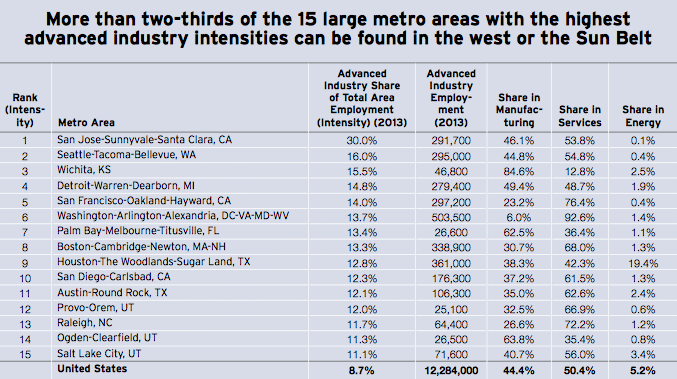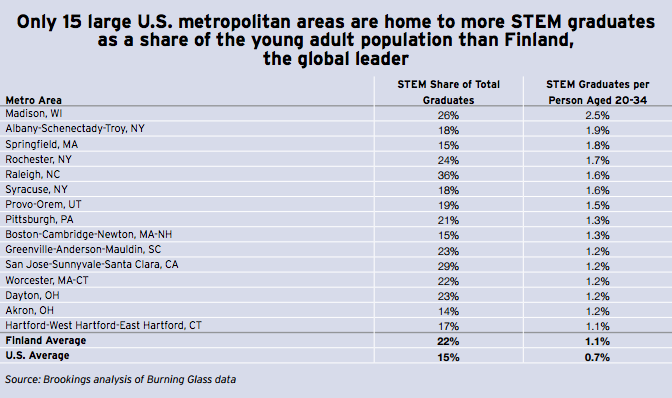Saying that America’s 50-industries-strong tech sector is “the country’s best shot at supporting innovative, inclusive, and sustainable growth,” a new Brookings report, “America’s Advanced Industries,” aims to underscore the urgency of focusing on economic renewal by supporting what it refers to as the “advanced industries sector” — car manufacturing, computer software, energy and more.
Such industries tend to concentrate in U.S. metropolitan regions, and the study found that the sector has led the post-recession employment recovery, making up 9 percent of total employment as of 2013. Naturally, the percentage shoots up when the report looks at specific regions.
Looking across the country, the 100 largest metro areas contain 70 percent of all U.S. advanced industries jobs. In terms of the sector’s local clustering, San Jose is the nation’s leading advanced industry hub with 30.0 percent of its workforce employed in the sector. Seattle follows with 16.0 percent of its local jobs in advanced industries. Wichita (15.5 percent); Detroit (14.8 percent), and San Francisco (14.0 percent) follow. Overall, advanced industries account for more than one in 10 jobs in nearly one-quarter of the country’s major metro areas
“By dint of their uneven distribution across U.S. states and regions, they represent a critical determinant of metropolitan prosperity … ,” the report notes.

But not all metros are riding that rising tide:
Conversely, 24 major metropolitan areas lost 10,000 or more advanced industry jobs, with the largest absolute losses occurring in Los Angeles, New York, Chicago, Cleveland, and Rochester, NY. In percentage terms, Youngstown, OH; Springfield, MA; Rochester, NY; Scranton, PA; and Providence, RI, saw the sharpest declines.
As for employees who can fill jobs in the sector, several urban regions have residents with the training that these industries need, but others are failing.
In 15 of the largest 100 U.S. metropolitan areas the number of STEM graduates as a share of the young adult population (aged 20 to 34) exceeds Finland’s, which holds the highest share internationally. These skills poles include some of the nation’s most successful advanced industry hubs, including Boston, San Jose, Raleigh, and Provo. At the other end of the spectrum, however, 33 large U.S. metropolitan areas’ STEM graduation rates trail those of Spain, which ranks 24th internationally. These metropolitan areas include prominent such places like Phoenix, Las Vegas, Miami, Dallas, Detroit, Houston, and Kansas City.

The report specifically points to a lag in workforce training. By Next City’s count, many nonprofits across the U.S. are making a push in this direction. For starters, see “In New England, Students Train for Blue-Collar Work Adapted for the New Age” and “Jobs Program Adds Hope and Healing to Tech Training.” Know of a successful jobs program helping a diverse U.S. workforce to prepare for the “advanced industries sector”? Please share in the comments below.
Marielle Mondon is an editor and freelance journalist in Philadelphia. Her work has appeared in Philadelphia City Paper, Wild Magazine, and PolicyMic. She previously reported on communities in Northern Manhattan while earning an M.S. in journalism from Columbia University.
Follow Marielle .(JavaScript must be enabled to view this email address)
















